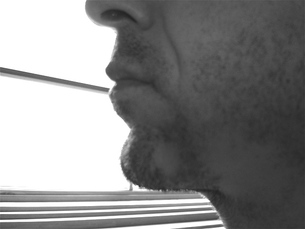
In an effort to find biological reasons for your patchy beard, and hopefully a nice natural fix, I researched many scientific articles that frankly were a bit over my head. But I’m a pretty smart guy, and I was able to take away some info and distill it down to the essential reasons why your beard is lackluster compared to the norm. Hopefully you will take away a better understanding of your frustrating situation and also some hope that the rapid progress in genetic research will someday create a solution.
To the science!
Beard hair growth, unlike the growth of head hair or other facial hair, like eyelashes, depends on compounds called androgens. Androgens are responsible for what are considered masculine features. The most famous androgen is our old friend we learned about in middle-school health class, testosterone.
Testosterone fueled your conversion from a boy to a man and took you through those hellish emotional changes and awkward physical changes we all had to suffer through. Now that you are an adult, your manly hormone keeps your muscles firm and useful and keeps your sex drive at a normal level. It is also beard food.
Inside each of your follicles is a structure called the dermal papilla. The dermal papillae are kind of like the “brains” of your hair follicles. The ones in your beard follicles respond to the messages that your androgens send and cause the surrounding parts of the hair follicles (called the hair matrix) to do their thing and make some damn beard hair. Guess what androgen tells the beard hair follicles to activate the hair matrix? Yep, testosterone.
So why not simply partake in some extra testosterone? Number one, it’s a controlled substance in the United States. Number two, there are other factors at work here that are sabotaging your beard growth.
When the dermal papillae of your beard follicles utilize testosterone, they actually metabolize it and create another androgen as a byproduct called dihydrotestosterone. This substance is like the bigger, stronger brother to testosterone. It contributes to male characteristics, just like wimpy old regular testosterone, just a lot more. It didn’t just kick start your pubescent transition to an adult male, it is pretty much the reason that you developed as a male in the womb.
To utilize testosterone and create dihydrotestosterone, your beard follicles need yet another substance, an enzyme called 5-alpha-reductase. This enzyme is necessary for this conversion, and if you have low levels of it, then you have low levels of dihydrotestosterone. More importantly to the topic at hand, if you don’t have enough 5-alpha-reductase, the dermal papillae of your beard follicles can’t properly use testosterone to tell your hair matrices to make hair. And if your beard hair matrices aren’t making hair, you aren’t growing a beard.
In case you got a bit lost in the science back there, let me summarize.
Each beard hair is like a little plant whose “seed” is buried within each follicle. Your beard seeds need testosterone and an enzyme to grow. The testosterone is like the water and the enzyme is like the germ inside the seed that takes the water and uses it to grow. Too little water means too little growth, but more importantly, if there’s no germ inside the seed, there’s no way anything is sprouting.
So what’s a guy with too little 5-alpha-reductase to do? The good news is that it is already the subject of much pharmacological effort. The bad news is that those efforts are currently working toward the goal of reducing the 5-alpha-reductase levels in normal men. Why in the world would they do that? Because of the dihydrotestosterone that it helps produce. You see, in the crazy mixed-up world of hair, too much dihydrotestosterone causes male pattern baldness! Yes, the more likely a man can grow a beard, the more likely he will eventually go bald. Elevated dihydrotestosterone levels may also contribute to an enlarged prostate and even prostate cancer. Hence the current 5-alpha-reductase inhibitors on the market today.
But take heart, you patchy-bearded soul. If a medicine can reduce the level of an enzyme, then there’s no reason one couldn’t be created to increase the levels instead. Maybe an intrepid reader of The Beard Coach will one day start a foundation to fund the development of such a drug. Until then, don’t fret. Your patchy beard doesn’t make you less of a man. You lack no testosterone man fuel. You simply suffer from a medical condition that one day in the glorious future may be cured. Then you can gladly take your beard pills and finally grow a one you can take home to Mom.
source

 RSS Feed
RSS Feed
